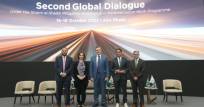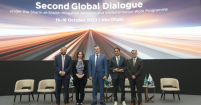

Second Global Dialogue in Abu Dhabi Explores Action-Oriented Path to Transport Decarbonisation
Newsletter
With the Intergovernmental Panel on Climate Change (IPCC)’s 6th Assessment Report showing that transport is the 4th largest emitter of greenhouse gas emissions, and the ‘Synthesis Report’ on the Technical Dialogue of the First Global Stocktake (GST), released in September of this year stating that the world is off the 1.5°C pathway and needs to quickly course correct, the Second Global Dialogue of the Sharm el-Sheikh Mitigation Ambition and Implementation Work Programme (MWP) could not have come at a more critical time.
In order to limit rising global temperatures and avoid the most catastrophic effects of climate change, there needs to be a collective increase in climate ambition and action. According to IRENA’s 2023 World Energy Transitions Outlook (WETO), course correcting to the 1.5°C pathway set out by the Paris Agreement, requires a tripling of global renewable power capacity from approximately 3,000 gigawatts (GW) to just over 11,000 GW by 2030.
Building a sustainable transport sector is critical to achieving these targets and was the focus of the UNFCCC’s Second Global Dialogue, which took place on October 15 and 16, 2023, hosted in Abu Dhabi by the COP28 Presidency and IRENA at the Abu Dhabi Global Markets.
Over course of two days, discussions, co-chaired by Amr Osama Abdel-Aziz of Egypt and Lola Vallejo of France, explored numerous solutions and strategies to decarbonising the transport sector. From individual presentations to roundtable discussions and break-out sessions, all shared a very clear sense of urgency that climate action needed to take place now.
“A one size fits all solution does not exist, so as we deliberate on the next steps to decarbonising the transport sector, we must make sure to re-write international cooperation with the understanding that restructuring requires nuance, equity and inclusivity,” stated IRENA’s Director General Francesco La Camera during the opening ceremony of the Second Global Dialogue.

What are the Global Dialogues?
In November 2021, the Conference of Parties came together to establish a work programme that would urgently scale up mitigation ambition and implementation to keep countries in line with the global stocktake. Then in 2022 they established the conditions of the work programme, one of which was to hold at least two global dialogues every year.
These dialogues offer a concrete opportunity to come together and discuss a strong implementation approach around the topics of that year and successfully assess its mitigation potential.
The first set of global dialogues focused on renewable energy, energy efficiency and carbon capture and storage. The second set focused on decarbonising the transport sector.

Day 1: Opportunities for a Just transition in the Transport Sector
Opening day remarks from Adnan Amin, CEO of the incoming COP28 presidency, IRENA’s Director General Francesco La Camera, Amb. Nabeel Munir, Chair of the Subsidiary Body for Implementation (SBI) and Simon Stiell, Executive Secretary of the United Nations Framework Convention on Climate Change (UNFCCC) Secretariat emphasised the gravity of the climate change situation.
They each called for collective and immediate action, especially now that we are less than 2 months away from the 28th United Nations Climate Change Conference (COP28) taking place in the United Arab Emirates (UAE) later this year.
The first day of the dialogues focused on shifting to collective and non-motorised modes of transport, energy and resource efficiency solutions, the electrification of vehicles, and shifting to low or zero carbon fuels.
There were avid discussions around everything from rethinking cities for people via more sustainable modes of transport, such as bike or car sharing, to shifting to more fuel efficient transport by utilising electric vehicles instead of traditional cars. Participants offered a wide-range of complementary solutions that had the potential to transform the sector in remarkably significant ways.
Anvita Arora, Program Director of Transport and Infrastructure at the King Abdullah Petroleum Studies advocated for a holistic transport sector shift, sharing that, “A multidimensional life-cycle and circular economy perspective is needed to develop integrated transportation 4decarbonisation policies that look beyond tailpipe emissions alone.”
According to IRENA, by implementing smart electrification strategies, countries can take scale-up action, reduce costs and significantly ramp up decarbonisation efforts towards net zero.
Gurbuz Gonul, IRENA’s Director of Country Engagement and Partnerships shared how, “In IRENA’s scenario, clean fuels, including liquid biofuel, hydrogen, synthetic kerosene, green ammonia and methanol, will contribute to a significant CO2 emissions reduction towards 2050 in the transport sector.”
To further Gurbuz’s point, IRENA’s analysis in our report Renewable Energy Policies for Cities: Transport highlights that an electrified transport sector supplemented by green fuels is the most cost-effective way to decarbonise the sector and reduce greenhouse gas emissions.

Day 2: Overcoming Barriers for a Just transition in the Transport Sector
The second day of dialogues focused on the barriers and challenges to achieving a just energy transition in the transport sector. With each presentation, it became clearer that in order for countries to create a comprehensive plan, there were several unique barriers they would need to tackle simultaneously.
Three core barriers were addressed during the dialogues.
Maruxa Cardama the Secretary General of the Stichting Partnership on Sustainable, Low Carbon Transport (SLOCAT) tackled the policy barrier, outlining how policy solutions should focus on creating compact, walkable and mixed-use cities that minimised car ownership. Celine Tan, a professor at the University of Warwick, outlined financial barriers, emphasising addressing them through holistic and country-specific financial reforms, and IRENA’s own Roland Roesch, the Director of the Innovation and Technology Centre at IRENA tackled technology and capacity challenges, spotlighting blind spots and their solutions from IRENA’s 2023 Innovation Landscape for Smart Electrification of End-Use Sector Report.
IRENA’s research has found that by formulating smart electrification strategies, countries can take concrete actions, minimise investment and significantly accelerate the transition towards net-zero.
Over the course of two days, insights from the Second Global Dialogue showed that decarbonising the transport sector presents a multifaceted challenge, demanding close collaboration and knowledge-sharing among nations, industries, and experts. As the countdown to COP28 continues, the world will have an opportunity to bring innovative strategies to the forefront and deepen international collaboration, showcasing a united front towards a sustainable and equitable future.




